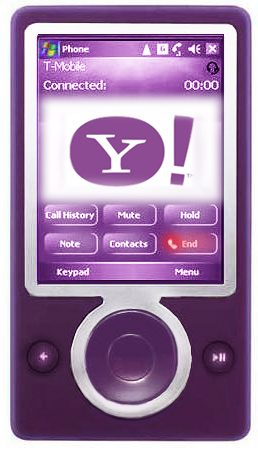Zune + Yahoo! = Y!Phone

 |
| Conceptual Rendering by Brandon Perlow |
Such a device, with a completely open API and open OS, and one that was highly subsidized by mobile telecommunications carriers, could seriously challenge iPhone and the BlackBerry for mobile smart phone device dominance, under the right economic conditions and successfully executed marketing campaign.
But as it becomes increasingly inevitable that a Microsoft and Yahoo! merger is going to occur – this despite the most recent rumblings of a possible AOL/Yahoo! merger or Google acting as an ad partner spoiler for the final MicroHoo consummation – I think it will be highly unlikely that I’ll ever get to see my dream Open Source iPhone and BlackBerry killer anytime soon, Android devices notwithstanding.
Click on the "Read the rest of this entry" link below for more.
That being said, I would be willing to be satisfied by the next best thing, a Windows Media-Powered “Y!Phone” that incorporated the features of the Zune portable media player, Wi-Fi connectivity and integration with all the Yahoo! and MSN/Microsoft online assets, built-in camera, integrated slide-out keyboard and HSDPA 3G data service with secure corporate email connectivity and ability to run third party Windows Mobile applications. This, at a corporate volume price point of less than $300 with carrier incentives, could be the device that everyone truly wants.
Of course, cheap 3G Windows Mobile devices have been around for some time now, such as the Samsung Blackjack, Palm Treo 700W and the Motorola Q Phone. And while the Blackjack and devices like it are pretty slick, they haven’t been able to capture the mass sex appeal of either the iPhone or the corporate workhorse mobile messaging market of the Blackberry. Something else needs to happen besides just cramming all of the services of Yahoo + MSN on a Windows Mobile device before people start thinking twice about tossing out their precious iPhones and Crackberries, myself included.
For starters, we need a great industrial design. More than anything else, iPhone and iPods are successful because of their sex appeal, there’s no doubt about that. And besides being physically attractive, the iPhone has a great interface, probably the best out of any consumer device out there on the market today. Windows Mobile needs a complete UI re-design, and Microsoft needs to dump the concept that our cell phones need to look and act just like our desktop OSes. I’ve had a number of Windows Mobile devices in the past -- such as the various HTC T-Mobile/O2 XDA/MDA units from different carriers with slide-out keyboards -- and while I could see their potential and thought the hardware design was good, I could never truly exploit them because the OS became too aggravating to work with. It comes as no surprise to me that HTC is now working with Microsoft's arch-enemy, Google, to release an Android-based device, code-named "Dream", that is expected to be released in late 2008. Now, a great Windows Mobile interface combined with sexy Silverlight-based Yahoo and MSN content? We could have a winner.
Also See: "How About an XPhone?"
An excellent industrial design and attractive user interface, plus Zune’s player capabilities might make prospective iPhone customers think twice, particularly if the device was significantly cheaper. However, with Google/Android and RIM/Blackberry both working on competing next generation devices, Microsoft needs to head the two of these off at the pass.
One of the biggest complaints of late about the BlackBerry is the single NOC point of failure that has caused at least two lengthy service disruptions in the last two years. The backlash to this has been so severe that some seasoned corporate travelers have now started bringing a second mobile device with them to swap SIM cards so they can get corporate email access if their BlackBerry service goes down.
So if Microsoft can partner with a respected, reliable enterprise hosting company and go with a distributed data center/NOC approach, combined with their patented Exchange replication technology, and permit easier, cheaper, and more reliable secure corporate mail integration with their integrated Mobile Outlook client (as well as no-brainer Hotmail, GMail and Yahoo Mail setup for our personal accounts) the frequent-flying, mass thumb-wheeling and thumb-balling orgies in airline Presidents Clubs and airport lounges across America might very well switch to Y!Phones instead instead of their precious RIM's.
Do You want to Y!Phone? Talk Back and let me know.